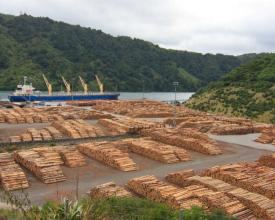DHA eNews – Trump Announces Section 232 Tariffs On Wood Products
On September 29, President Trump announced the long-awaited Section 232 tariffs on wood products. Despite DHA's advocacy for tariffs on hardwood plywood, engineered wood flooring, and hardwood veneer imports, these products were not included in the first round. But, the announcement includes a procedure for adding more wood products.
DHA has ramped up our advocacy to get our products included, sending a direct communication to President Trump and publicizing this in the press. Roseburg's recent closing of its hardwood plywood mill is another wake-up call that underscores the need for tariffs to prevent dumped and subsidized plywood from Asia, whose underpriced plywood dominates with 80% of the U.S. market. Dumped, subsidized plywood from Asia has been killing U.S. manufacturing facilities and eliminating thousands of jobs in rural communities around the country. It’s some comfort that the reciprocal tariffs now apply to these products, but the rates are not high enough to level the playing field, and these reciprocal tariffs could go away with the upcoming Supreme Court decision.
If you have questions or comments, contact me. I look forward to hearing from you.

Keith A. Christman, President

On September 29, the Trump administration announced the long-awaited Section 232 tariffs on wood products. It imposes a 10% global tariff on imports of softwood lumber; a 25% global tariff on most upholstered furniture, increasing to 30% on January 1; and a 25% global tariff on kitchen cabinets and vanities, increasing to 50% on January 1. The announcement also imposed reciprocal tariffs on wood products that were previously exempt.
On September 30, DHA and several member CEOs sent a letter to President Trump asking him to include hardwood plywood, hardwood veneer, and engineered wood flooring imports in Section 232 tariffs. We emphasized that Roseburg Forest Products just made the difficult decision to close their last remaining hardwood plywood plant in the U.S. and that 80% of the U.S. market is now controlled by dumped and subsidized imports from Asia.
On October 3, DHA published a widely distributed press release highlighting the request by nine industry leaders for Section 232 tariffs to be applied to decorative hardwoods.
Jeremy Manthei, CEO of Manthei Wood Products, said, "Unfair trade practices have victims: the mill workers, loggers, and families of rural communities throughout the country, including in Michigan and Wisconsin. Dumped and subsidized hardwood plywood from overseas is wiping out our industry."
Greg Pray, President and CEO of Columbia Forest Products, added, "Columbia Forest Products has spent millions of dollars successfully pursuing trade cases against Chinese dumping and subsidies of hardwood plywood only to see them quickly transship or move parts of production to allied countries. Section 232 tariffs on hardwood plywood from these allied Asian countries would be a lifeline to struggling mills in rural communities throughout the United States."
On October 2, Treasury Secretary Bessent stated that the White House will announce a bailout for farmers negatively impacted by retaliatory tariffs as soon as this week. The Hardwood Federation is pushing for hardwoods to be included in any aid package.
Just after midnight on October 1, funding for most government operations stopped after Congress failed to agree on a short-term continuing resolution to maintain current spending. Currently, both parties are firmly set in their positions. Democrats are seeking $1.5 trillion for healthcare subsidies in exchange for reopening the government. October 15 may force the issue, as that's the date when active duty military would miss their next paycheck.
The U.S. Department of Agriculture published its plan that details which department functions will continue during the government shutdown and confirmed that timber sales will remain supported throughout the shutdown.
The new Section 232 tariffs affect imports of wood-based upholstered chairs, cabinets, and vanities. Industry executives are reacting and adapting to the change. Demand for locally made furniture is strong enough that the Vaughan-Bassett Furniture plant in Virginia has added hours and overtime to keep up. The company president confirmed that demand has risen as tariffs made imports less attractive, creating support for American-made goods.
The European Commissioner for Environment notified the European Parliament of her intention to delay implementation of the EU Deforestation Regulation by one more year, citing concerns about the IT platform that will manage compliance data.
The Forest Stewardship Council suspended its memorandum of understanding with Asia Pacific Resources International Holdings Limited (APRIL), which operates in Indonesia and China. The FSC acted after being "informed of serious allegations of violence involving Toba Pulp Lestari (TPL), a member of APRIL's corporate group, and an Indigenous community in North Sumatra, Indonesia."
On September 25, DHA member Roseburg Forest Products announced that it has ceased operations at its last remaining hardwood plywood plant and will exit the hardwood plywood market. The reason, Roseburg stated, is imports: "While hardwood plywood has been part of Roseburg's portfolio for decades, the market has shifted significantly, with lower-cost imports now accounting for roughly 80% of the U.S. market."
For two years, the American Hardwood Export Council (AHEC) has worked with noted environmental journalist Fred Pearce to tell the story of hardwood forests and the people who depend on them. The project, Forested Future, was chosen for the BARQ Architectural Film Festival in Barcelona in November.
Much of the U.S. Forest Service's wildfire preparation and prevention work has been paused during the government shutdown. This affects 193 million acres of national forest. While the Forest Service's contingency plan ensures that fighting wildfires will continue, the work needed to reduce the fuel for massive wildfires, including prescribed burns, is on hold.
Over the last ten years, drought and insects have killed an unprecedented number of Oregon's Douglas fir trees. The result is billions of dollars in lost timber value, damage to infrastructure, and an increased risk of wildfires. About 635,000 acres of forest in southwest Oregon and the Willamette Valley have been affected.
Which bear won Katmai National Park and Preserve's Fat Bear Week?





